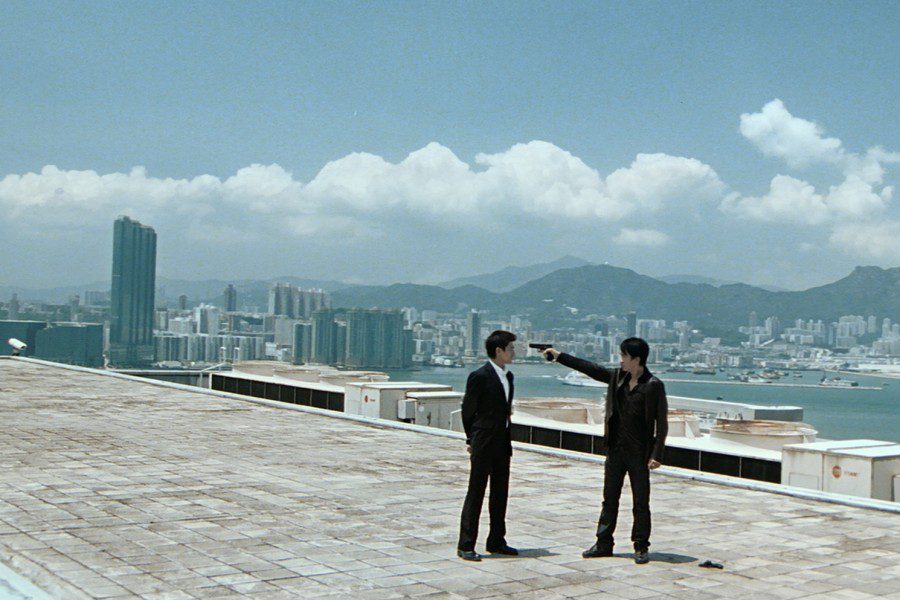Review: ‘Infernal Affairs’ trilogy restoration reinvigorates a Hong Kong classic
Even two decades later, Janus Films’ restoration of the iconic “Infernal Affairs” trilogy reminds audiences that its messages are pertinent more than ever.
Hong Kong thriller trilogy ”Infernal Affairs” tells familiar messages about opposite identities and human progress. It is currently available at Film at Lincoln Center until Sept. 29. (Courtesy of Janus Films)
September 28, 2022
“Infernal Affairs” (2002) directors Alan Mak and Andrew Lau use gang wars, police surveillance and political history to examine identity crises in the new millennium. Beneath the many rivalries, layers of deceit and hidden loyalties is a tragic, psychological portrait of two men: Chen Wing Yan (Tony Leung Chiu-wai) and Lau Kin Ming (Andy Lau). Yan is a police officer infiltrating a notorious South Kowloon triad, while Lau is a triad informant infiltrating the police force. Trapped between the violence of the criminal underworld and the bureaucracy of law enforcement, both characters are driven to their limits as the distinction between their real and false identities becomes blurred.
Janus Films, a renowned distributor of classic and world cinema, breathes new life into the gritty urban palette of Lau’s cinematography in a digital restoration of the film trilogy. The blockbuster’s visual style continues to stand out compared to its peers, predecessors and successors within the action genre. Rather than opting for a vibrant and commercial look, the film directors went with a more realistic style with muted colors, similar to that of Hong Kong New Wave cinema.
The crisp visuals of the Kowloon skyline, lined with cloud-piercing glass and steel beams, enhance the creeping sense of danger and entrapment that emerges across all three films. The dynamic and fast-paced editing — filled with flashing multiperspective close-ups and dramatic wide shots — emphasizes the dangerous dance the characters are taking part in: a game of survival where the cost of living is the total destruction of your enemy.
“Infernal Affairs” remains relevant through its thematic focus on false and fractured identities, which is explored through a series of conflicting parallels — the cop versus the criminal, the old order versus the new and duty versus self-preservation. Although the films’ messaging is most associated with post-handover Hong Konger identity, a conversation which has found renewed importance 20 years later, Lau and Mak’s examination of the crisis remains universal. The same anxieties about imminent economic collapse, rapid technological change, and conflicting national and moral identities that emerged in Hong Kong during the early 2000s have bring up broader issues that remain unresolved in our modern global conscience.
The film is elevated not only by its striking visual style, but also its music. The score, composed and performed by Chan Kwong-wing, is full of deeply haunting orchestral sequences, emphasizing the delicate nature of the status quo and its oncoming collapse. The opening track played during the title sequences evokes a feeling of descending into a chaotic inferno, mirroring the downward spiral of the central characters’ lives. More important than the score, however, is the recurring use of Taiwanese pop icon Tsai Chin’s “被遺忘的時光 (Forgotten Times)” throughout the three films. This song expresses a romantic nostalgia for bygone times, which perfectly captures the tragedy conveyed throughout this narrative.
Although two decades have passed, this trilogy has maintained its international legacy, especially among its Sinophone audience. Every screening I attended at the Walter Reade Theater was packed with Chinese moviegoers from all walks of life. The restoration of these films is a celebration of a shared cultural heritage.
Although deeply tied to its setting in the urban landscapes of Kowloon and Hong Kong Island, the theme also speaks to the greater trajectory of Sinophone arts and cinema culture generally, addressing the issue of whether or not individualized artistic expression can survive in a market of fierce commercial competition. The films’ messages about the individual’s place in a changing political and social world are still deeply profound today.
“Infernal Affairs” is playing at Film at Lincoln Center until Sept. 29.
Contact Mick Gaw at [email protected].

























































































































































